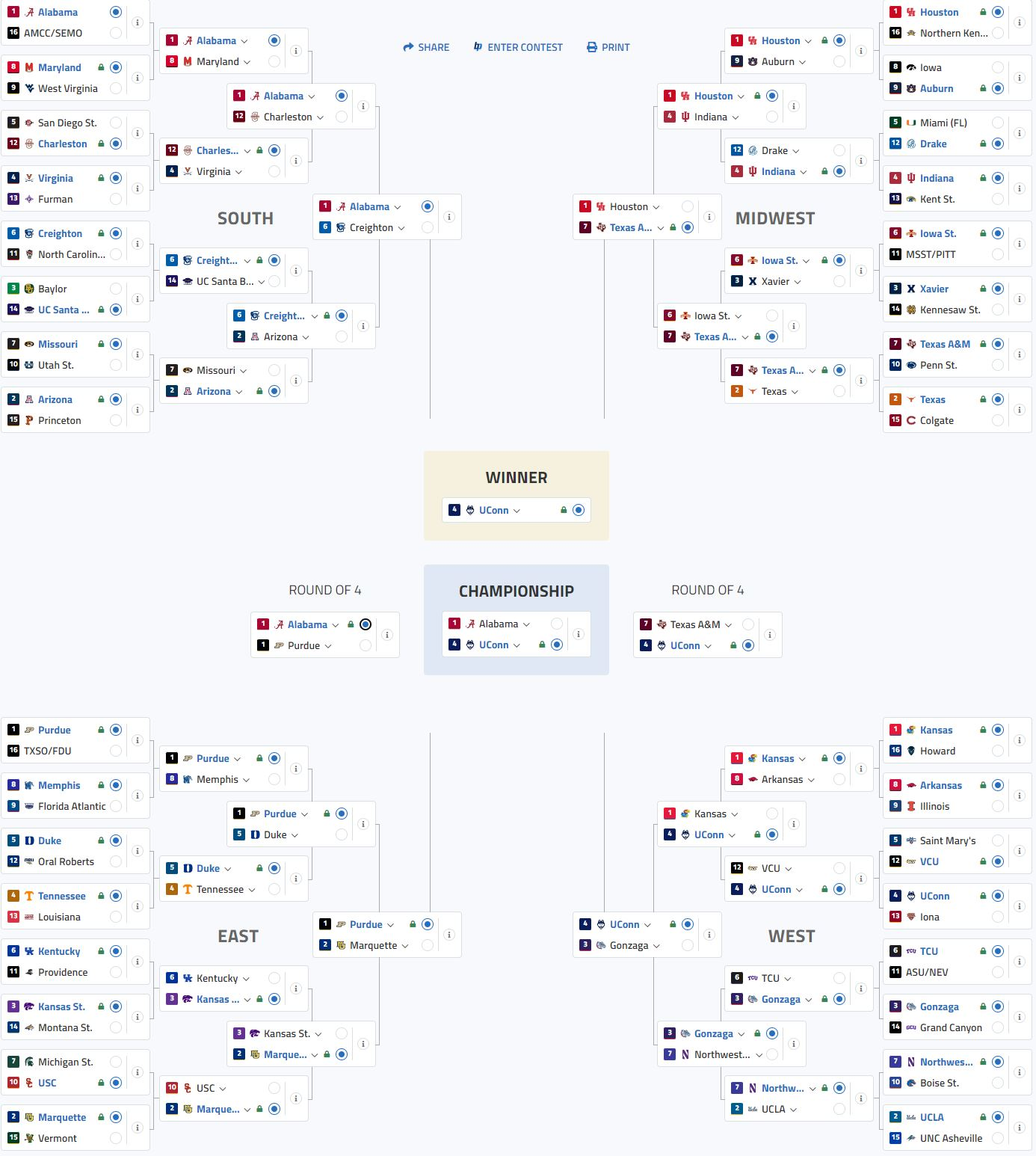When it comes to NCAA bracket odds, the chances of crafting a perfect NCAA bracket are astronomically low, making office pools and bracket predictions an exhilarating yet daunting undertaking for fans. Statisticians suggest that selecting all 63 winning teams correctly is akin to winning the Powerball twice—a feat virtually unheard of in the world of sports. During the NCAA tournament, where excitement and unpredictability are the norm, understanding NCAA tournament statistics becomes crucial for anyone hoping to emerge victorious in their office pool. While many aim for that elusive perfect bracket, the reality is that identifying NCAA bracket upsets can play a significant role in distinguishing your picks from the masses. With each round of games, the competition intensifies, making strategic and informed predictions essential for a successful NCAA tournament experience.
The pursuit of a flawless NCAA bracket is not just a quest for glory; it stems from a passion for predictions during the exhilarating time of March Madness. The dynamics of bracketology require participants to analyze team strengths, leverage past tournament patterns, and be ready for unexpected turnarounds, also known as upsets. In this thrilling postseason, fans engage with a myriad of statistical data as they seek to gain an edge in their bracket selections. Mastering the art of picking winners while anticipating surprises can significantly enhance the chance of triumphing in bracket competitions. As fans dive into this annual tradition, the challenges and intricacies of predicting outcomes make each game day electrifying and deeply engaging.
Understanding NCAA Bracket Odds
The odds of picking a perfect NCAA bracket are astronomically low, with statistics indicating that it is virtually impossible for anyone to achieve in their lifetime. The mathematical expression for this is 1 in 2^63, equating to quintillions of combinations for just 64 games. To illustrate this, it’s akin to winning the Powerball lottery consecutively, making it a daunting rack to face for even the most seasoned statisticians. With no reported instances of a perfectly completed bracket, the pursuit remains a tantalizing challenge for fans during the NCAA tournament.
Moreover, predictive strategies in NCAA bracket competitions underscore the importance of statistical analysis. Top seeds generally maintain their positions, particularly in early rounds, complicating the journey toward a perfect bracket. It’s not merely a game of chance; informed choices based on historical performance and current season statistics play a crucial role. Consequently, individuals pursuing a perfect NCAA bracket should not underestimate the impact of data in their predictions, as relying solely on luck can prove to be futile.
Secrets to Winning Your Office Pool
Securing a victory in your office pool during the NCAA tournament hinges on two main factors: understanding bracket predictions and strategic upset selections. While picking favorites might seem like a safe strategy, the key to differentiation in a crowded pool lies in identifying potential upsets. This balance of risk and prudence is essential for standing out among peers, particularly in larger competitions where many participants share similar choices.
Using NCAA tournament statistics is imperative when selecting your bracket. These statistics provide insights into team performances and can help predict potential upsets. For instance, analyzing matchups and team dynamics, such as defensive strengths and offensive weaknesses, can bolster your predictions. Armed with this information, competitors can create a more strategic approach that may not only lead to success in securing victory in their office pools but also enhance their overall enjoyment of the tournament experience.
The Role of Bracket Predictions in NCAA Success
Bracket predictions serve as a vital tool for fans participating in the NCAA tournament. They provide insights into team matchups, reveal potential underdogs, and highlight historical trends that can influence outcomes. For instance, experts often analyze previous tournament performances and statistical distribution of seeds to create informed predictions, which can vastly improve an individual’s chances of filling out a successful bracket.
Moreover, these predictions are not merely based on whim; they are informed by extensive NCAA tournament statistics that account for team performance metrics, player injuries, and other critical factors. By aligning your bracket with expert predictions, you can refine your selections and better navigate the unpredictable nature of NCAA games. Incorporating this approach can significantly enhance one’s competitiveness in the NCAA tournament and make for a more thrilling viewing experience.
Navigating NCAA Bracket Upsets
One critical aspect of filling out a successful NCAA bracket involves anticipating potential upsets. Statistically speaking, upsets are a staple of the NCAA tournament, where lower-seeded teams frequently outperform expectations. To capitalize on this, it’s essential to review both team histories and recent performances, identifying patterns that might suggest when an upset is likely to occur. For example, a 12-seed defeating a 5-seed is a well-documented upset trend, and being able to identify which teams fit these dynamics can boost your bracket’s chances.
Additionally, leveraging team dynamics—such as momentum gained during conference tournaments or head-to-head matchups—can inform strategic upset selections. Sometimes, momentum can outweigh traditional metrics, particularly as teams gain confidence. Hence, when approaching bracket selections, fans should remain mindful of these variables, ensuring their predictions reflect not just raw statistics but also the emotional and psychological components that can influence game outcomes.
Mathematical Insights Behind Perfect NCAA Brackets
The quest for the perfect NCAA bracket can be explored through mathematical insights that reveal the complexities involved. The sheer volume of potential outcomes, expressed mathematically as 1 in 2^63, illustrates why a perfect bracket is such an elusive target. Even skilled analysts, who dissect every variable, struggle to navigate the odds without embracing some degree of randomness or luck.
Moreover, the mathematics involved in predicting NCAA outcomes extends beyond simple probability; it includes statistical models that incorporate past performance data, player metrics, and external factors such as injuries or weather conditions that can affect game dynamics. Engaging with these mathematical insights not only enlightens fans about what makes NCAA brackets so challenging but also underlines the importance of rigorous analysis in striving for a successful outcome.
The Importance of Strategic Thinking in Bracket Filling
Strategic thinking is paramount when filling out an NCAA bracket, especially with the aim of winning office pools. Rather than relying on gut feelings or arbitrary choices, fans should consider methodical approaches to their selections. This includes analyzing team strengths, understanding historical trends, and recognizing when to pick favorites and when to take risks on upsets.
Furthermore, incorporating different strategies for various pool sizes is crucial. In larger pools, where participants are likely to make similar selections, diverging from consensus selections can be advantageous. By effectively introducing calculated risks and employing sound statistical practices, competitors can significantly enhance their bracket’s potential, navigating through the ups and downs of the NCAA tournament.
Embracing the Ups and Downs of NCAA Tournament Predictions
One of the most exhilarating aspects of the NCAA tournament is the unpredictability that comes with bracket predictions. Each year, fans witness surprising upsets that defy seeding expectations and throw established predictions out the window. Embracing this chaos is part of the fun, as it reflects the underdog spirit that makes March Madness captivating for viewers, players, and analysts alike.
Moreover, understanding that not every prediction will come to fruition fosters a healthier perspective on the tournament. Fans should enjoy the process of filling out brackets, utilizing their knowledge to make educated guesses while acknowledging that outcomes can be surprising. By balancing expectation with excitement, participants can take full advantage of the unique experiences offered by the NCAA tournament, regardless of their bracket’s ultimate success.
Data-Driven Approaches to NCAA Bracket Success
Adopting a data-driven approach to NCAA brackets can significantly increase the odds of success. By leveraging analytics and statistical models, fans can make predictions that go beyond intuition or sentiment. Tracking key performance indicators, such as points per game, defensive efficiency, and win-loss records, builds a clearer picture of how teams are positioned going into the tournament.
Additionally, utilizing advanced data analytics tools can offer deeper insights into team matchups and potential game outcomes. Data from prior tournaments, combined with real-time performance metrics, empowers fans to make more informed selections. The sophistication of these data-driven approaches not only enhances prediction accuracy but also elevates the overall engagement with the NCAA tournament, transforming casual viewers into informed participants.
Final Thoughts on Perfecting Your NCAA Bracket Strategy
Creating a perfect NCAA bracket may remain an elusive aspiration, but with the right strategy, significant improvement is achievable. Understanding that while a perfect bracket is unlikely, informed decisions rooted in statistical analysis can markedly increase one’s chances of success. Emphasizing a balanced selection strategy—between safe bets and bold upsets—will help participants better navigate the competitive landscape of the NCAA tournament.
Ultimately, participating in March Madness should be an enjoyable experience, characterized by both excitement and engagement. Even when facing the inevitable unpredictability of the tournament, embracing the process of filling out brackets, learning from previous tournaments, and sharing insights with fellow fans can enrich the journey. Those who approach their NCAA bracket strategy with both data and enthusiasm are sure to have a memorable tournament experience.
Frequently Asked Questions
What are the odds of completing a perfect NCAA bracket?
The odds of completing a perfect NCAA bracket are astronomical, estimated at 1 in 2 to the 63rd power, which is a quintillion. This means it’s extremely unlikely to happen in anyone’s lifetime, especially considering that no one has officially reported a perfect bracket.
How can I improve my NCAA bracket predictions?
To enhance your NCAA bracket predictions, focus on gathering NCAA tournament statistics, analyzing team performance, and understanding the historical trends of upsets. This information can provide a more informed basis for your selections and increase your chances of making accurate picks.
What strategies can help me win my office pool with my NCAA bracket?
Winning your office pool requires a balance of picking favorites and selecting some key upsets to distinguish your NCAA bracket from others. Understand your competition, use NCAA tournament statistics, and identify where upsets may occur to enhance your overall chances.
Are NCAA bracket upsets common, and how can I predict them?
Yes, NCAA bracket upsets are common, particularly during the tournament. To predict these upsets, analyze team matchups, look for weaknesses in higher-seeded teams, and consider factors such as injuries or momentum shifts. Researching past tournament outcomes can also provide insights into potential surprises.
What are some tips for creating a successful NCAA bracket?
For a successful NCAA bracket, begin by studying NCAA tournament statistics, focusing on team seedings, and researching known patterns such as the historical success of certain seeds. Incorporating a mix of strategic picks and upset predictions can lead to a more competitive bracket.
How likely is it to pick all the favorites in an NCAA bracket?
While picking all the favorites in an NCAA bracket may seem like a safe strategy, it’s crucial to recognize that tournaments often feature unexpected outcomes. Statistically, picking solely favorites may not yield the best results, as some of the most memorable tournament moments arise from upsets.
Is there a formula for making NCAA bracket predictions?
There isn’t a definitive formula for NCAA bracket predictions, but using a combination of analytics, NCAA tournament statistics, and understanding team dynamics can help. Analyzing trends, injuries, and historical performances can create a more robust predictive model.
Can past NCAA tournament statistics help with current bracket choices?
Absolutely! Past NCAA tournament statistics provide valuable context for current bracket choices. Trends in seed performance, upset patterns, and team histories can inform more strategic decisions and enhance overall prediction accuracy.
What role do NCAA bracket odds play in determining the best picks?
NCAA bracket odds significantly impact determining the best picks as they reflect the likelihood of teams advancing based on historical data. Utilizing these odds appropriately can help you weigh your selections against potential outcomes and improve your chances of success.
How can I utilize bracket predictions to fill out my NCAA bracket?
Utilizing bracket predictions involves accessing expert analyses, statistical models, and consensus rankings to inform your selections. Combining this information with your insights and preferences can create a more comprehensive approach to filling out your NCAA bracket.
| Key Point | Details |
|---|---|
| Odds of a Perfect NCAA Bracket | The chances are 1 in 2^63, which is in the quintillions, making it extremely unlikely to happen in anyone’s lifetime. |
| Historical Context | No one has officially achieved a perfect bracket in NCAA history. |
| Top Seeds Performance | Top-seeded teams usually don’t lose in the first round, which skews the odds. |
| Upsets | While picking favorites is essential, correctly predicting upsets is critical for success in larger pools. |
| Office Pools Strategy | To win, distinguish your picks from others in the pool by selecting a mix of favorites and strategic upsets. |
Summary
NCAA bracket odds are notoriously steep, with experts suggesting that achieving a perfect bracket is nearly impossible, often compared to winning the Powerball multiple times. The extreme difficulty stems from the number of games and the inherent unpredictability of matchups, especially concerning upsets. Understanding these odds can inform strategies for participating in NCAA bracket pools, where a mix of favorites and calculated upsets is crucial for standing out among competitors.



